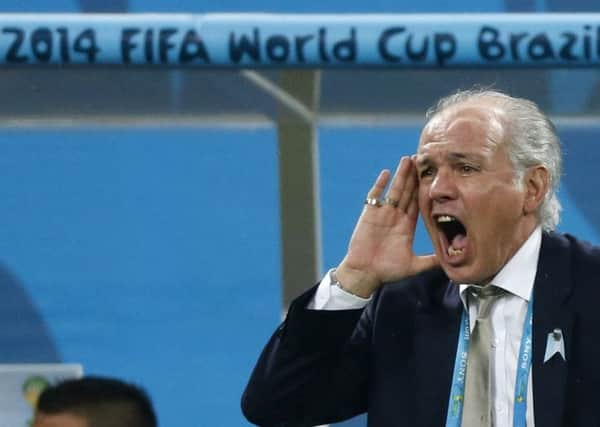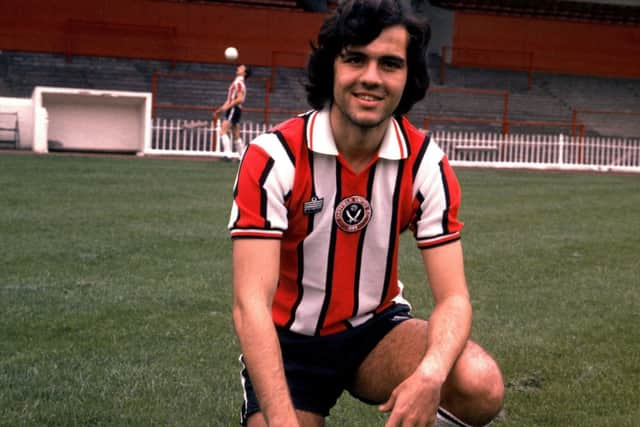World Cup: Sabella, Argentina’s Yorkshire terrier


WHILE Arthur Graham has become used to hearing idle local gossip across the bar in his pub in Yorkshire, it isn’t often he is stopped in his tracks the way he was recently when hearing news with a more international flavour. Just before the World Cup started a friend wanted to know if he was aware who was in charge of the Argentina national team.
“I said: no, tell me,” relates Graham, via a phone call to his home yesterday. “And he said, Alex Sabella.
Advertisement
Hide AdAdvertisement
Hide Ad“I was like, Alex Sabella? Alex? You’re kidding me. Alex Sabella is manager of Argentina? Although of course it is Alejandro now.”


Indeed it is. Alejandro Sabella. The man who stands on the brink of becoming revered throughout Argentina for leading the Albiceleste to World Cup glory against Germany in the Maracana stadium. However, that Graham was unaware that his former Leeds United team-mate had risen to such an exalted position says much about Sabella’s stealth-like qualities. He doesn’t like to make a fuss. He was furious that his agent leaked the news that he intends to stand down after tonight’s final.
On Wednesday night, in the media room of the Corinthians Arena in Sao Paulo, his reaction to Argentina securing their place in the final was remarkably downbeat. Despite being blessed with the extraordinary talent of Lionel Messi, his team have managed to become tagged as “difficult to beat”. He repeated his mantra, one he learned from a manager at Gremio, that the most effective way to win a match is “to cover spaces”.
Argentina are indeed defensively sound, helped by a goalkeeper whose slection, despite not playing regularly for Monaco, was considered reason to criticise Sabella before the tournament. Sergio Romero’s performances so far are why one banner was unfurled in the stadium against the Netherlands, where the goalkeeper went to make a match-winning contribution in the penalty shoot-out, which said, simply, “Sorry Sabella”.
“He was not so popular [at the start],” explains Alfredo Camponovo, a radio reporter for the Cordoba-based station Radio Gamba. “You have to remember that in the last World Cup Diego Maradona was fronting our national team. The change between that and Sabella is extreme.”
It might prove difficult if Sabella, who turns 60 on Bonfire night, wishes to slip away quietly after tonight’s game, particularly if he wins the World Cup and becomes a perhaps unlikely, and definitely uncomfortable, national hero. This will be different to the status he attained in Sheffield and Leeds, where he was considered to be only a very local hero.
Raised in Buenos Aries, honed in Sheffield and then refined in Leeds some still like to claim. In truth, the time he spent in England was short, although he was there long enough to leave a distinct impression on those such as Graham, who played on the opposite flank to Sabella at Leeds United for a season in the early 1980s.
“He always had his socks down,” recalled Graham yesterday. “I thought: Alex you are going to get some tackles when you go about the pitch, and he did as well, but he never shirked from them, to be fair to him.” Although Sabella’s English was serviceable at the time, Graham remembers it proving difficult for him to understand the message that he should be wearing shin-pads.
Advertisement
Hide AdAdvertisement
Hide AdGraham was something of an expert on Argentine football by the time they joined forces, having scored for Scotland against Argentina and, perhaps more notably, exchanged shirts with Maradona after the then 18-year-old had scored his first goal for his country at Hampden Park.
The story is now viewed as apocryphal, but it was reported that when Sabella first arrived in England, at Sheffield United shortly after the 1978 World Cup in Argentina, the man – or indeed, boy – the Bramall Lane club originally wanted to sign was Maradona. However, his price tag was considered too high.
Sheffield United manager Harry Haslam was viewed as something of a visionary when he spent £160,000 to bring Sabella to the English Second Division, hoping to take advantage of interest in Argentine football that had been sparked by the recent World Cup. Sabella’s arrival blazed a trail since it was shortly afterwards that the slightly higher-profile World Cup-winning pair of Ricky Villa and Osvaldo Ardiles joined Spurs.
Sabella did not score in his first game for Sheffield United, but another familiar figure did – a teenager called Simon Stainrod, helped by an assist from the exotic new signing. Rather than being disappointed in the reputed failure to capture Maradona’s signature – “I am not sure he was up to my standards,” quips Stainrod, from his home in the south of France – the former Dundee manager was simply glad to have teamed up with Sabella, who became a powerful ally. “After training with me for the first time, he went to the manager and said I should be in the team, and so I was given a game,” recalls Stainrod.
“He was a No.10 at the same time as Maradona so he was always going to have a job getting in the national team. He never took a bad touch, always took a player on, and he was quite strong as well.”
Unlike Graham, who had failed to keep up with his team-mate’s even recent movements, Stainrod can report relatively recent contact with Sabella. They met for lunch in Buenos Aires before Sabella’s first opportunity as a manager in his own right, something which came as recently as 2009 with Estudiantes. Prior to breaking out on his own, Sabella was the long-time assistant to former Argentina captain Daniel Passarella, with the pair taking charge of the national team at France 98 as well as having spells at Uruguay, River Plate and Corinthians, here in Brazil.
“I went to see him a few years ago in Buenos Aires,” recalls Stainrod, who now works as an agent. “I took him out to lunch with my wife. My wife speaks Spanish so I took her along in case he didn’t speak any English, or had lost what he had, but his English was fantastic.
“He was out of work at the time,” he continues. “I was going to help him try and find a club in England. In the meantime he got a job at Estudiantes and took them to the Copa Libertadores title – he got the job at Argentina on back of that. But he was actually a bit down when I last saw him.”
Advertisement
Hide AdAdvertisement
Hide AdThis, it seems, is just how he is. Despite the flamboyant image he had projected on to him when he pitched up in Leeds and Sheffield, something he helped encourage by wearing socks rolled down to his ankles, Sabella’s character has more in common with these English towns than it does Buenos Aires, the city where he could become the toast tonight.